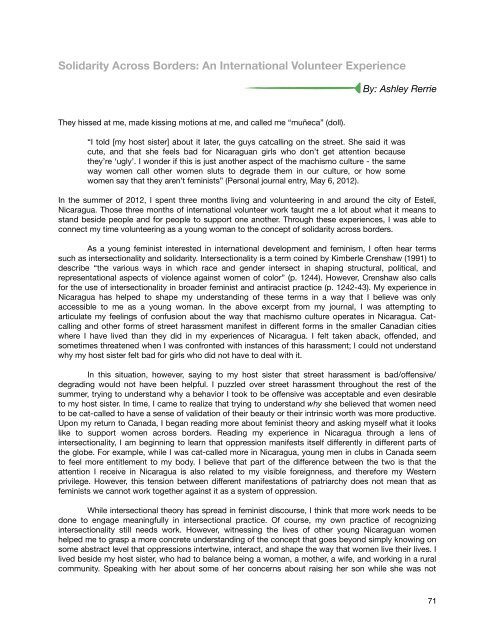Undercurrent-Issue-Fall-Winter-2014-3
Undercurrent-Issue-Fall-Winter-2014-3
Undercurrent-Issue-Fall-Winter-2014-3
You also want an ePaper? Increase the reach of your titles
YUMPU automatically turns print PDFs into web optimized ePapers that Google loves.
Solidarity Across Borders: An International Volunteer ExperienceBy: Ashley RerrieThey hissed at me, made kissing motions at me, and called me “muñeca” (doll).“I told [my host sister] about it later, the guys catcalling on the street. She said it wascute, and that she feels bad for Nicaraguan girls who don’t get attention becausethey’re ‘ugly’. I wonder if this is just another aspect of the machismo culture - the sameway women call other women sluts to degrade them in our culture, or how somewomen say that they aren’t feminists” (Personal journal entry, May 6, 2012).In the summer of 2012, I spent three months living and volunteering in and around the city of Estelí,Nicaragua. Those three months of international volunteer work taught me a lot about what it means tostand beside people and for people to support one another. Through these experiences, I was able toconnect my time volunteering as a young woman to the concept of solidarity across borders." As a young feminist interested in international development and feminism, I often hear termssuch as intersectionality and solidarity. Intersectionality is a term coined by Kimberle Crenshaw (1991) todescribe “the various ways in which race and gender intersect in shaping structural, political, andrepresentational aspects of violence against women of color” (p. 1244). However, Crenshaw also callsfor the use of intersectionality in broader feminist and antiracist practice (p. 1242-43). My experience inNicaragua has helped to shape my understanding of these terms in a way that I believe was onlyaccessible to me as a young woman. In the above excerpt from my journal, I was attempting toarticulate my feelings of confusion about the way that machismo culture operates in Nicaragua. Catcallingand other forms of street harassment manifest in different forms in the smaller Canadian citieswhere I have lived than they did in my experiences of Nicaragua. I felt taken aback, offended, andsometimes threatened when I was confronted with instances of this harassment; I could not understandwhy my host sister felt bad for girls who did not have to deal with it.! In this situation, however, saying to my host sister that street harassment is bad/offensive/degrading would not have been helpful. I puzzled over street harassment throughout the rest of thesummer, trying to understand why a behavior I took to be offensive was acceptable and even desirableto my host sister. In time, I came to realize that trying to understand why she believed that women needto be cat-called to have a sense of validation of their beauty or their intrinsic worth was more productive.Upon my return to Canada, I began reading more about feminist theory and asking myself what it lookslike to support women across borders. Reading my experience in Nicaragua through a lens ofintersectionality, I am beginning to learn that oppression manifests itself differently in different parts ofthe globe. For example, while I was cat-called more in Nicaragua, young men in clubs in Canada seemto feel more entitlement to my body. I believe that part of the difference between the two is that theattention I receive in Nicaragua is also related to my visible foreignness, and therefore my Westernprivilege. However, this tension between different manifestations of patriarchy does not mean that asfeminists we cannot work together against it as a system of oppression.! While intersectional theory has spread in feminist discourse, I think that more work needs to bedone to engage meaningfully in intersectional practice. Of course, my own practice of recognizingintersectionality still needs work. However, witnessing the lives of other young Nicaraguan womenhelped me to grasp a more concrete understanding of the concept that goes beyond simply knowing onsome abstract level that oppressions intertwine, interact, and shape the way that women live their lives. Ilived beside my host sister, who had to balance being a woman, a mother, a wife, and working in a ruralcommunity. Speaking with her about some of her concerns about raising her son while she was not71


